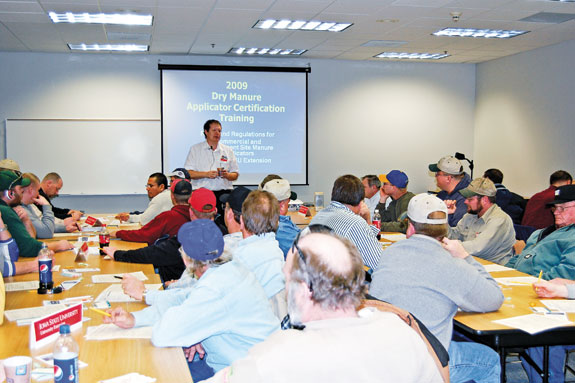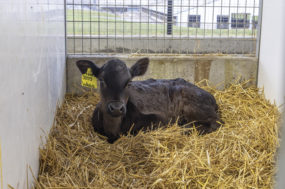Manure application is a big business. Commercial manure services and custom haulers or applicators are a very important component to agriculture, providing services that allow livestock producers to focus on livestock concerns and crop producers to focus on production practices.
Many commercial manure services or businesses are leaders in equipment innovation and application techniques and offer a high degree of service to their clients.
The industry has matured in recent years, with many states requiring some kind certification or annual training for commercial manure haulers.
Commercial manure businesses invest hundreds of dollars in getting employees trained to meet requirements, but many also offer training above and beyond that required by states or provinces. Many businesses now provide year-round employment opportunities as they have diversified, and that has increased the rate of retention for experienced and qualified employees.
While many livestock farmers have already contracted services to have manure applied this fall, here are some things you should consider when hiring a commercial applicator.
Hire a certified commercial manure service
Several states and provinces require custom manure haulers to meet certification requirements. Know these requirements for your location and hire accordingly. Contact your local agricultural or regulatory department to obtain a list of certified applicators. Ask the business to provide documentation of their certification and make sure all employees have met certification requirements.

Inquire about additional training or membership in applicators’ associations
While certification or training is required in some places, some businesses require additional in-house training. This training may include developing manure spill response techniques, tractor or equipment handling and safety training. Ask the business if they attend or offer training in addition to the state certification requirements.
Also inquire if the business or owner is a member of any associations for manure or nutrient applicators. Membership in these associations can foster communication, ideas and response to legislation.
Ask to see a copy of an emergency or spill response plan
Spill response is highly dependent on each situation; however, there are some basic steps that can be employed in advance of manure pumping and land-application, as well as during a spill event. Ask the commercial manure application business to share a copy of their emergency or spill response plan with you. If they do not have a plan, you should carefully consider the risk in hiring that business.
Likewise, as a livestock owner, you need to share your emergency/spill response plan with the commercial applicator. Walk them through separation distances for land application and show them where tile inlets and other sensitive areas are located. Provide a list of emergency phone numbers you would use in the event of a spill, power failure or other emergency. Share a list of available neighbors with extra pumps or dirt-moving equipment.
It is recommended to have a copy of the commercial applicator’s current insurance policy. This would be used to ensure they have proper coverage should an accident occur involving their equipment, their employees and/or another vehicle or property damage.
It is important to discuss and supply biosecurity and ventilation protocols for pumping to ensure employee protection, animal health and protection of property. Having ventilation protocols in place prior to pumping will keep everyone involved educated and alerted to the potential risks involved while pumping.
Most importantly: Make sure no employees of the facility or the commercial pumping business ever enter a building or manure storage structure being agitated or pumped, and maintain increased ventilation for a minimum of one hour after all activity has ceased in that barn prior to allowing anyone to enter.
Availability and land-application timing
Fall is the primary manure application season, but fall application poses many challenges if the weather is wet or the ground freezes early. There has also been an increase in the amount of corn-to-corn rotations, which generally leads to a later harvest than a bean-to-corn rotation.
Some states have laws in place that regulate timing and placement of manure application during winter months. All of these factors have combined to shorten the window of application, putting more pressure to start as soon as harvest begins, taking every opportunity to apply when soil conditions are optimum.
Understanding that managing nitrogen and other nutrients is a priority, you also need to consider the availability of a commercial applicator and work with that commercial applicator to find a balance of timing and nutrient management.
If manure serves as your primary nutrient source for crop production, application later in the fall may help conserve nitrogen. You may need to consider negotiating with your commercial applicator to make sure their application schedule meets your crop production and storage needs, realizing that application later in the fall is also subject to weather issues and potentially less flexibility of a commercial applicator’s schedule.
If optimum soil conditions exist to apply in early fall, discuss the availability of a nitrogen stabilizer that could be added during application that may help conserve nitrogen for crop uptake.
Method of application
The method of manure application can affect nitrogen loss from volatilization, increase odors, reduce residue amounts and can increase erosion potential. Consider hiring a commercial applicator that has application equipment that can meet your needs or requirements for residue management, erosion control and odor management.
Other things to consider prior to application are agitation and pumping. Depending on your storage environment, you will want to discuss agitation and how much is needed, accounting for solids and ventilation risk.
A professional commercial application business is a valuable resource and generally can provide a wealth of knowledge in all aspects of commercial manure application. Once you’ve hired a commercial applicator, a relationship should develop which provides a good line of communication to plan the timing of application, provides accurate nutrient placement and an increased level of trust that biosecurity and ventilation protocols are followed to help reduce potential risk to health and property. PD
Angela Rieck-Hinz is an extension program specialist for Iowa State University Extension and is the coordinator of the Iowa Manure Management Action Group (IMMAG). You can read more about manure management issues by visiting the IMMAG webpage at http://www.agronext.iastate.edu/immag/
This article was originally published on the Iowa Manure Management Action Group web page in September 2010 and has been adapted for this use.
PHOTOS:Photos courtesy of Iowa State University.
Angela Rieck-Hinz is a extension specialist with Iowa State University. Email Angela Rieck-Hinz.

.jpg?t=1687979285&width=640)



